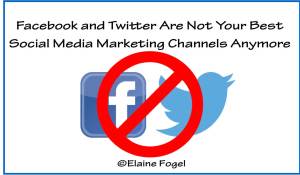Facebook marketing
I’ll  bet your small business or nonprofit organization spends considerable time on its Facebook page and Twitter account trying to engage new people. After all, aren’t these two social media sites the most effective in reaching prospects, customers, and donors?
bet your small business or nonprofit organization spends considerable time on its Facebook page and Twitter account trying to engage new people. After all, aren’t these two social media sites the most effective in reaching prospects, customers, and donors?
Not anymore says a recent Forrester study. “It’s clear that Facebook and Twitter don’t offer the relationships that marketing leaders crave. Yet most brands still use these sites as the centerpiece of their social efforts — thereby wasting significant financial, technological, and human resources on social networks that don’t deliver value,” says Nate Elliott of Forrester.
Now get this… “In the next 18 months… Facebook will become nothing but a repository for display ads,” Elliott predicts. Holy!!
So now what? Continue reading
 Right now, Facebook is still number one. With more than a billion monthly active users (as of December 2012), you’re probably wondering why I question whether its market share is going to wane.
Right now, Facebook is still number one. With more than a billion monthly active users (as of December 2012), you’re probably wondering why I question whether its market share is going to wane.
Maybe not immediately, but is there a trend on the horizon?
Pew Research Center’s Internet & American Life Project conducted a survey that indicates this interesting behavior:
- 61% of current Facebook users say that at one time or another in the past they have voluntarily taken a break from using Facebook for a period of several weeks or more.
- 20% of the online adults who do not currently use Facebook say they once used the site but no longer do so.
- 8% of online adults who do not currently use Facebook are interested in becoming Facebook users in the future.
And, what about users’ plans for use this year?
- 3% of Facebook users say they plan to spend more time on the site in the coming year.
- 27% of Facebook users say they plan to spend less time on the site in the coming year.
- 69% of Facebook users say they plan to spend the same amount of time on the site this coming year.
In market research, respondents’ intended behavior is not as reliable as their past behavior. It will be interesting to see if these percentages change by end of year.
If you’re targeting young adults, take note of this finding: “Young adults are the most likely forecasters of decreased engagement. Some 38% of Facebook users ages 18-29 expect to spend less time using the site in 2013.”
What about YOU? Are you using Facebook less, more, or the same?
